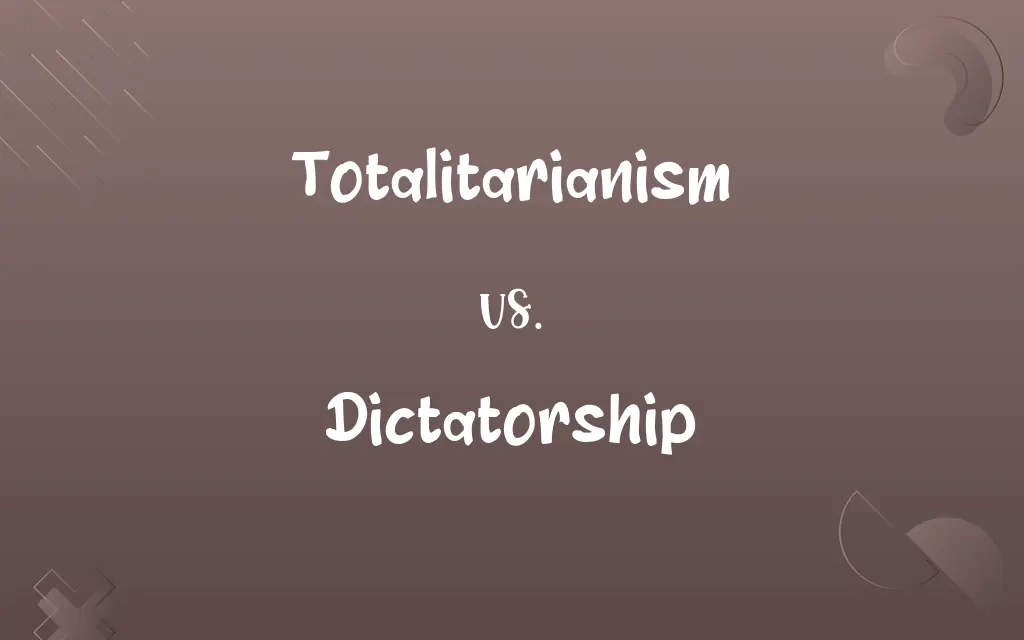Totalitarianism vs. Dictatorship: Know the Difference

By Shumaila Saeed || Published on December 29, 2023
Totalitarianism is a system where the state holds absolute control over all aspects of life, whereas dictatorship is rule by a single leader with absolute power.

Key Differences
Totalitarianism involves complete state control over every aspect of public and private life, emphasizing a collective ideology. Dictatorship, on the other hand, centers around the absolute authority of an individual leader, with less focus on ideological control.
Shumaila Saeed
Dec 29, 2023
In totalitarian regimes, the government controls the economy, politics, society, and culture, often through propaganda and surveillance. In dictatorships, the focus is more on the absolute power of the ruler, with less comprehensive control of societal aspects.
Shumaila Saeed
Dec 29, 2023
Totalitarianism often requires citizen participation in government-led programs and a unified belief system. Dictatorship may not demand such active participation or ideological uniformity, focusing instead on obedience to the ruler.
Shumaila Saeed
Dec 29, 2023
Censorship and repression are common in both systems, but totalitarianism extends this to thought control and the shaping of beliefs. In dictatorships, repression might be more focused on political dissent rather than comprehensive thought control.
Shumaila Saeed
Dec 29, 2023
Totalitarian states often have a single-party system that permeates every aspect of life, while dictatorships can exist within various political structures, with the central element being the unchallenged authority of the dictator.
Shumaila Saeed
Dec 29, 2023
ADVERTISEMENT
Comparison Chart
Nature of Control
Absolute over public and private life
Centered on ruler's absolute authority
Shumaila Saeed
Dec 29, 2023
Ideological Emphasis
High, with a unified ideology
Varies, with less focus on ideology
Shumaila Saeed
Dec 29, 2023
Government Structure
Often single-party system
Can vary, central element is the dictator
Shumaila Saeed
Dec 29, 2023
Public Participation
Required in state programs and ideology
Less emphasis on participation or belief
Shumaila Saeed
Dec 29, 2023
Censorship and Repression
Extends to thought control
Focused more on political dissent
Shumaila Saeed
Dec 29, 2023
ADVERTISEMENT
Totalitarianism and Dictatorship Definitions
Totalitarianism
Totalitarianism is a political system where the state holds total authority over society and seeks to control all aspects of public and private life.
In the novel 1984, the fictional totalitarian regime monitors and controls even the thoughts of its citizens.
Shumaila Saeed
Dec 05, 2023
Dictatorship
Dictatorship is a form of government where a single person or a small group possesses absolute power without effective constitutional limitations.
The dictatorship saw the rapid consolidation of power in the hands of the leader.
Shumaila Saeed
Dec 05, 2023
Totalitarianism
Totalitarianism involves the government’s total control of the media, economy, and culture of a nation.
Under totalitarian rule, all news broadcasts were regulated by the government.
Shumaila Saeed
Dec 05, 2023
Dictatorship
A system of rule in which one person, a dictator, has absolute control over all governmental policies and decisions.
Under the dictatorship, new laws were enacted without the input of a legislative body.
Shumaila Saeed
Dec 05, 2023
Totalitarianism
A system of government that is centralized, dictatorial, and requires complete subservience to the state.
The totalitarian government required all citizens to attend state-sponsored rallies.
Shumaila Saeed
Dec 05, 2023
ADVERTISEMENT
Dictatorship
A government or a social situation where one person makes all the rules and decisions without input from anyone else.
In the dictatorship, public protests against the ruler were forbidden.
Shumaila Saeed
Dec 05, 2023
Totalitarianism
A political system in which the government recognizes no limits to its authority and strives to regulate every aspect of public and private life.
The totalitarian regime implemented strict curfews and travel restrictions.
Shumaila Saeed
Dec 05, 2023
Dictatorship
Dictatorship often involves the suppression of political opposition and the absence of democratic processes.
The dictatorship silenced all opposition parties and controlled the media.
Shumaila Saeed
Dec 05, 2023
Totalitarianism
Totalitarianism is characterized by strong central rule that attempts to control and direct all aspects of individual life through coercion and repression.
In the totalitarian state, dissent was met with severe punishment.
Shumaila Saeed
Dec 05, 2023
Totalitarianism
Of, relating to, being, or imposing a form of government in which the political authority exercises absolute and centralized control over all aspects of life, the individual is subordinated to the state, and opposing political and cultural expression is suppressed
"A totalitarian regime crushes all autonomous institutions in its drive to seize the human soul" (Arthur M. Schlesinger, Jr.).
Shumaila Saeed
Dec 01, 2023
Totalitarianism
A system of government in which the people have virtually no authority and the state wields absolute control, for example, a dictatorship.
Shumaila Saeed
Dec 01, 2023
Dictatorship
A type of government where absolute sovereignty is allotted to an individual or a small clique.
Shumaila Saeed
Dec 01, 2023
Totalitarianism
A form of government in which the ruler is an absolute dictator (not restricted by a constitution or laws or opposition etc.)
Shumaila Saeed
Dec 01, 2023
Totalitarianism
The principle of complete and unrestricted power in government
Shumaila Saeed
Dec 01, 2023
Dictatorship
Any household, institution, or other organization that is run under such sovereignty or autocracy.
Shumaila Saeed
Dec 01, 2023
Dictatorship
The office, or the term of office, of a dictator; hence, absolute power.
Shumaila Saeed
Dec 01, 2023
Dictatorship
A form of government in which the ruler is an absolute dictator (not restricted by a constitution or laws or opposition etc.)
Shumaila Saeed
Dec 01, 2023
Dictatorship
Dictatorship is characterized by authoritarian leadership, where decisions are made by the dictator without regard for individual rights or freedoms.
The dictatorship abolished free elections, cementing the leader's power.
Shumaila Saeed
Dec 05, 2023
Repeatedly Asked Queries
What is Totalitarianism?
Totalitarianism is a political system where the state holds total authority over society and seeks to control all aspects of public and private life.
Shumaila Saeed
Dec 29, 2023
What is a Dictatorship?
A Dictatorship is a form of government where a single person or a small group possesses absolute power without effective constitutional limitations.
Shumaila Saeed
Dec 29, 2023
Is Totalitarianism always a Dictatorship?
Not necessarily, but most Totalitarian states are dictatorships due to the concentration of power in one authority.
Shumaila Saeed
Dec 29, 2023
Can a Dictatorship be Totalitarian?
Yes, a Dictatorship can be Totalitarian if the dictator exercises extensive control over both the government and the society.
Shumaila Saeed
Dec 29, 2023
Are all Dictatorships Totalitarian?
No, some Dictatorships may not seek to control every aspect of life and society.
Shumaila Saeed
Dec 29, 2023
How does Totalitarianism differ from a Dictatorship?
Totalitarianism involves comprehensive control over all aspects of society, while a Dictatorship primarily means absolute rule by an individual or group without the same level of societal control.
Shumaila Saeed
Dec 29, 2023
Can Totalitarianism exist in a democracy?
Totalitarianism is antithetical to democracy, as it denies fundamental democratic principles like freedom and pluralism.
Shumaila Saeed
Dec 29, 2023
What is the key feature of Totalitarianism?
The key feature is the attempt to control all aspects of life, including the economy, education, art, science, private life, and morals of citizens.
Shumaila Saeed
Dec 29, 2023
Is Totalitarianism linked to a specific ideology?
No, it can be linked to various ideologies; what unites them is the pursuit of total control.
Shumaila Saeed
Dec 29, 2023
Can a Dictatorship be benevolent?
Theoretically, a dictatorship can be benevolent, but in practice, absolute power often leads to abuse and oppression.
Shumaila Saeed
Dec 29, 2023
Do Totalitarian states have elections?
If they do, the elections are generally not free or fair, serving more as a tool of propaganda.
Shumaila Saeed
Dec 29, 2023
How do international communities generally view Dictatorships?
Dictatorships are often criticized internationally for human rights violations and lack of democratic governance.
Shumaila Saeed
Dec 29, 2023
Can technology strengthen Totalitarian control?
Yes, advanced technology can enhance surveillance and control capabilities of a Totalitarian regime.
Shumaila Saeed
Dec 29, 2023
What are examples of Totalitarian regimes?
Historical examples include Nazi Germany under Hitler and the Soviet Union under Stalin.
Shumaila Saeed
Dec 29, 2023
How does a Dictatorship maintain power?
Dictatorships often maintain power through force, propaganda, censorship, and suppression of opposition.
Shumaila Saeed
Dec 29, 2023
What's the economic structure in a Totalitarian state?
It varies, but the state often controls the economy and all major resources.
Shumaila Saeed
Dec 29, 2023
What happens when a Dictator dies?
It can lead to a power vacuum, succession struggle, or transition to a different form of governance.
Shumaila Saeed
Dec 29, 2023
How do citizens live under a Dictatorship?
Citizens often live with limited freedoms, fear of government repression, and lack of political pluralism.
Shumaila Saeed
Dec 29, 2023
What is the role of propaganda in Totalitarianism?
Propaganda is crucial in Totalitarianism for controlling public opinion and suppressing dissent.
Shumaila Saeed
Dec 29, 2023
Can Totalitarian regimes change over time?
Yes, they can evolve or collapse, often depending on internal and external pressures.
Shumaila Saeed
Dec 29, 2023
Share this page
Link for your blog / website
HTML
Link to share via messenger
About Author
Written by
Shumaila SaeedShumaila Saeed, an expert content creator with 6 years of experience, specializes in distilling complex topics into easily digestible comparisons, shining a light on the nuances that both inform and educate readers with clarity and accuracy.









































































